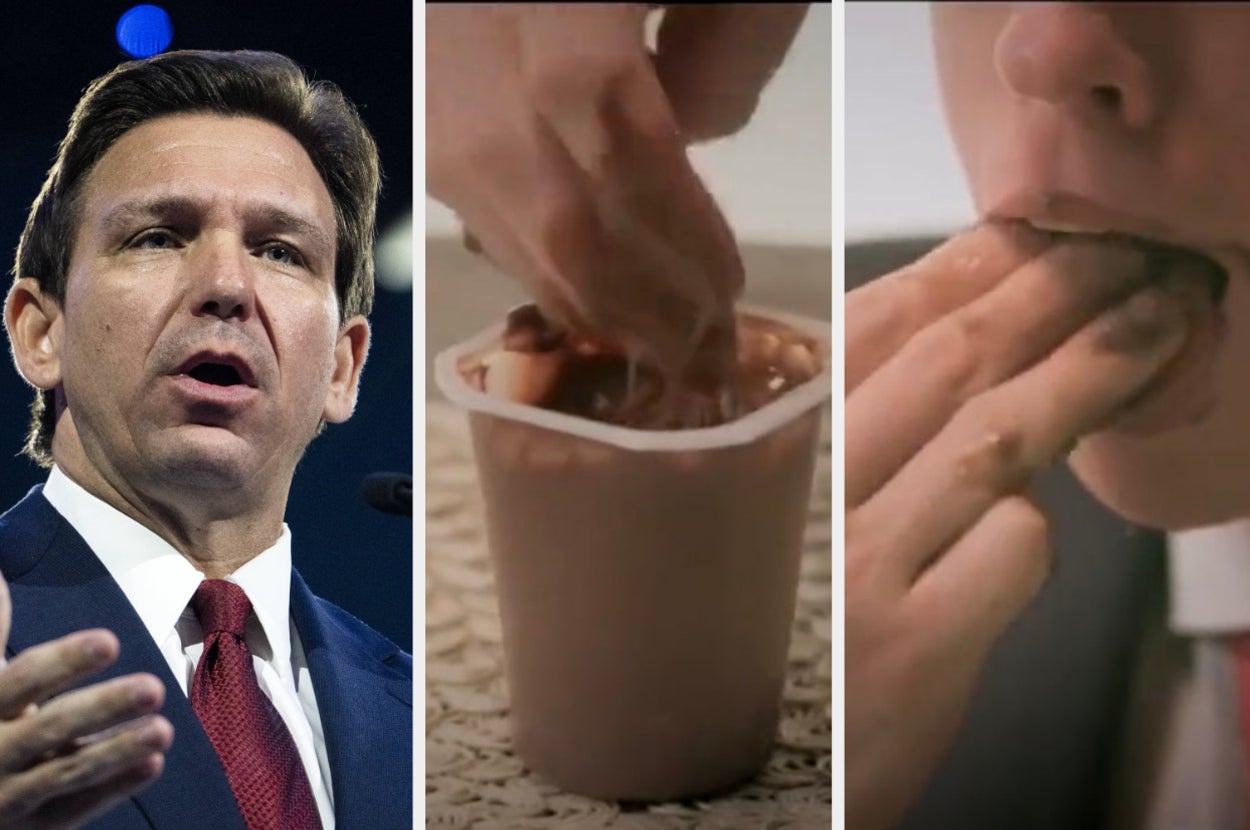On a recent Friday, a new advertisement titled “Pudding Fingers” made its debut across various social media platforms, the content of which quickly proliferated into a broader television audience with spots airing on major networks such as CNN and Fox News. The advertisement roots itself in a particularly intriguing anecdote involving Governor Ron DeSantis—a story that first garnered significant attention last month when it was reported by The Daily Beast.
The Daily Beast’s article highlighted a series of less-than-flattering narratives surrounding Governor DeSantis’s personal mannerisms, specifically his etiquette or lack thereof when it comes to food consumption during meetings. According to the report, which cited two unnamed sources, an unusual incident occurred in 2019 while DeSantis was traveling on a private aircraft. The sources recounted an episode where the Governor, much to the surprise (and perhaps dismay) of his staff members, chose to eat a chocolate pudding not with the conventional utensil—a spoon—but rather, with his fingers, using three of them to scoop the dessert directly from the container.
This peculiar method of eating quickly caught the eye of the public and media alike, leading to a swift and viral spread of the story across the internet. Memes, social media posts, and humorous nicknames soon followed, with some online communities dubbing him “Puddin’ Ron.” This epithet, along with the story itself, began circulating widely, contributing to a more caricatured image of DeSantis.
The narrative gained enough traction that major publications like New York magazine’s Intelligencer didn’t hesitate to comment on the potential ramifications of such public perception. The Intelligencer promptly pronounced that this story would “stick to DeSantis like pudding to fingers,” postulating that such unflattering attention might pose a significant obstacle should he decide to pursue higher political office, such as a bid for the White House in 2024.
Yet, amidst the growing whirlwind of media coverage and public discourse, Governor DeSantis responded to the claims during an interview with Piers Morgan. He addressed the unusual anecdote with a measure of denial mixed with ambiguity. DeSantis stated that he did not recall engaging in that specific behavior as an adult, although he conceded that it might have been something he did as a child.
The broader implications of this minor yet vivid incident open up several avenues of discussion regarding not only DeSantis’s personal habits but also how these might reflect on his political persona and electoral prospects. Public figures, particularly those in or eyeing the highest offices in the land, face immense scrutiny regarding both their public policies and private lives. In the digital age, where images and videos can be disseminated globally in just moments, even seemingly minor lapses can be magnified and potentially used to a detrimental effect.
This situation also speaks volumes about the power of media in shaping political narratives. The quick transformation of a private moment into a public spectacle underlines the vulnerability of political figures to what some might consider trivial lapses into potentially career-affecting stories. Media outlets, social media networks, and the public thus play integral roles in the construction of political figures’ public personas—often extending beyond their political positions and actions into the domain of personal behavior and quirks.
Moreover, this incident underlines the interaction between media portrayal and public perception in the realm of politics, where both traditional news outlets and newer digital platforms significantly influence the reputation and public lives of political actors. In this age of viral content and social media prevalence, even an act as innocuous as eating pudding in an unconventional manner can spiral into a narrative with possibly wider political ramifications.
For Governor DeSantis, the immediate future will likely involve more scrutinized public appearances and perhaps a more cautious approach to his public image, especially as the 2024 presidential election looms. How much the “Pudding Fingers” incident will impact his political journey remains to be seen, but it stands as a testament to the unforgiving eye of the public and media that today’s politicians must navigate. Such events pose intriguing questions regarding public persona management, the media’s influence, and the intersection of personal habits with public expectations in political life. As political trajectories are increasingly swayed by media narratives, instances like these will possibly become more significant in shaping not just public perceptions but potentially the outcomes of electoral politics.









